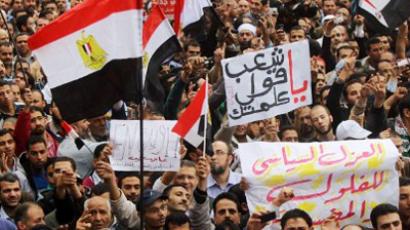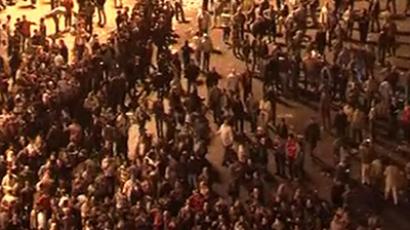Egypt Supreme Council agrees to form salvation govt
Egypt's ruling military council has accepted the resignation of the Cabinet and agreed to form the national salvation government. It also pledged to stage presidential elections and transfer power to a civilian government by July 1, 2012.
Speaking to Egyptians on Tuesday evening, the de-facto ruler Field Marshal Mohamed Hussein Tantawi stated: “I decided to accept Sharaf's government resignation, but they continue until we find an alternative.”He confirmed that the next president will be elected by the end of June 2012. But according to AP’s source at the Tahrir Square, Egypt protesters reject military offer of elections by July saying that they “are not leaving, he (De-facto ruler Field Marshal Mohamed Hussein Tantawi) leaves."Earlier, the council offered the former head of the IAEA Mohammed El Baradei to become a new prime minister after the government submitted a resignation. The military council was unwilling to accept the former Prime Minister Essam Sharaf’s government resignation until the new candidate on the PM’s seat is appointed. El Baradei has agreed to form a new government on condition he has complete authority. He also said that the military council should apologize for the violence and stop all military trials of civilians, reports RT’s correspondent Paula Slier who is in the epicenter of protests at Tahrir Square in Cairo. The Muslim Brotherhood has indicated their support for the appointment of Mohammed El Baradei, according to RT’s correspondent. On Tuesday the council held emergency talks with political groups to deal with the volatile situation in the country.People want the military to go and also say that Mohammed El Baradei is supported by the west, Paula reports. However, investigative journalist Tony Gosling told RT that keeping in mind Mohammad El Baradei’s past career, he seems to be “a very good person”.“He is certainly a very good choice. He is potentially someone that the people can trust from the West and, most importantly from within Egypt. He seems to be a fantastic person, if he can and if he does have a total free hand to do what he wants there,a way of defusing this situation," he said.
At the same time, former Prime Minister Essam Sharaf has said that he has no intention of returning to power, but the people need to calm down, Paula Slier reported.Dr Ayman Salama, professor of International Law at Cairo University told RT the move to appoint Mohammed El Baradei – a figure who is favored by the public – as prime minister is an attempt to appease protesters.“The majority of the Egyptians believe that Mohammad El Baradei would be the appropriate man in this very crucial moment,” he said.He also pointed out that it took long for the international community to condemn the excessive use of force by the police in Egypt – live ammunition being fired, videos of police beating protesters with batons.“It was yesterday that the EU and today the African Union appealed the Egyptian military to stop the excessive use of force against the protesters. The killings of the protesters in Egypt are not acceptable and tolerable. This is a grave violation of human rights and this is destroying the reputation in the eyes and minds of the majority of the Egyptians."
Over 33 people already confirmed dead and about 1,500 injured since Saturday, when the violent clashes between the army and the protesters started. It has been revealed on Tuesday that military forces used live ammunition, hitting people in necks and heads. The so-called Egypt’s revolution 2.0 erupted on Friday, when over 50,000 Egyptians were back on Tahrir Square to demand that the military hand over power to a civilian government.














